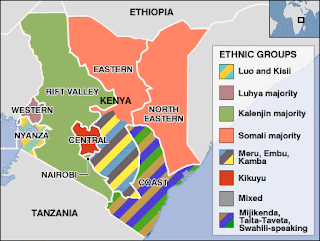Before coming to Kenya, I was apprehensive about the food. I had read all about the abundance of starches: potatoes, rice, plantains, fried dough…maybe all at the same meal. Kenyans ate with the goal of getting full enough to power through the day at the lowest cost possible. And at first, Kenyan cuisine was in line with my fears. While we stayed at hostels, a typical meal included at least three starches, some of them fried, and chewy red meat in broth. Morning tea was accompanied by the Kenyan equivalent to doughnuts. I imagined the four months stretching out ahead of me and pictured my waistband stretching out along with them.
 |
| Mandazi=doughnuts |
But now here I sit at my homestay waiting for dinner, and I’m really looking forward to it. My homestay parents go to the market each Saturday and return with loads of fresh fruits and vegetables. Our evening meal is typically chock full of bright, colorful veggies like okra, butternut squash, eggplant, and lentils. A little more oil goes into the pan than what I’m used to at home (I haven’t seen Pam cooking spray in any supermarket), but overall this is amazing food. We had chapati, Kenya’s trademark fried tortilla, with our meal last night, but it was prepared with whole-wheat flour rather than the typical white.
 |
| Chapati |
How did I end up in a health-conscious household with wifi and hot water? I hope I don’t jinx anything by writing this :S
Thankfully I’ve steered clear of matumbo. As in tripe. Which I know from my meat-judging days is cow intestines. I said coming in to this that I would give everything a shot, but I might have to make myself a liar on this one.
There are a few other traditional dishes I have yet to come across, but I’ve liked most of the ones I’ve tried. Ugali, a thick, millet-based staple food, is very filling and not unpleasant. Some of my classmates are being force-fed the stuff, so their opinons may differ from mine. Sukuma wiki, a slaw made from kale and onions, is pretty tasty too, despite its similarity to seaweed.
 |
| Sukuma wiki: Trust me, it's better than it looks. Especially if you douse it in ketchup. |
One thing I’m excited to try is nyama choma, the roasted meat that Kenya boasts as its specialty. Actually, I think mama Agness is making it tonight. I’m typically weary of meat here, but my Swahili teacher said today, “you will try nyama choma and, mmm, you will just die.” Apparently that’s a good thing.






































